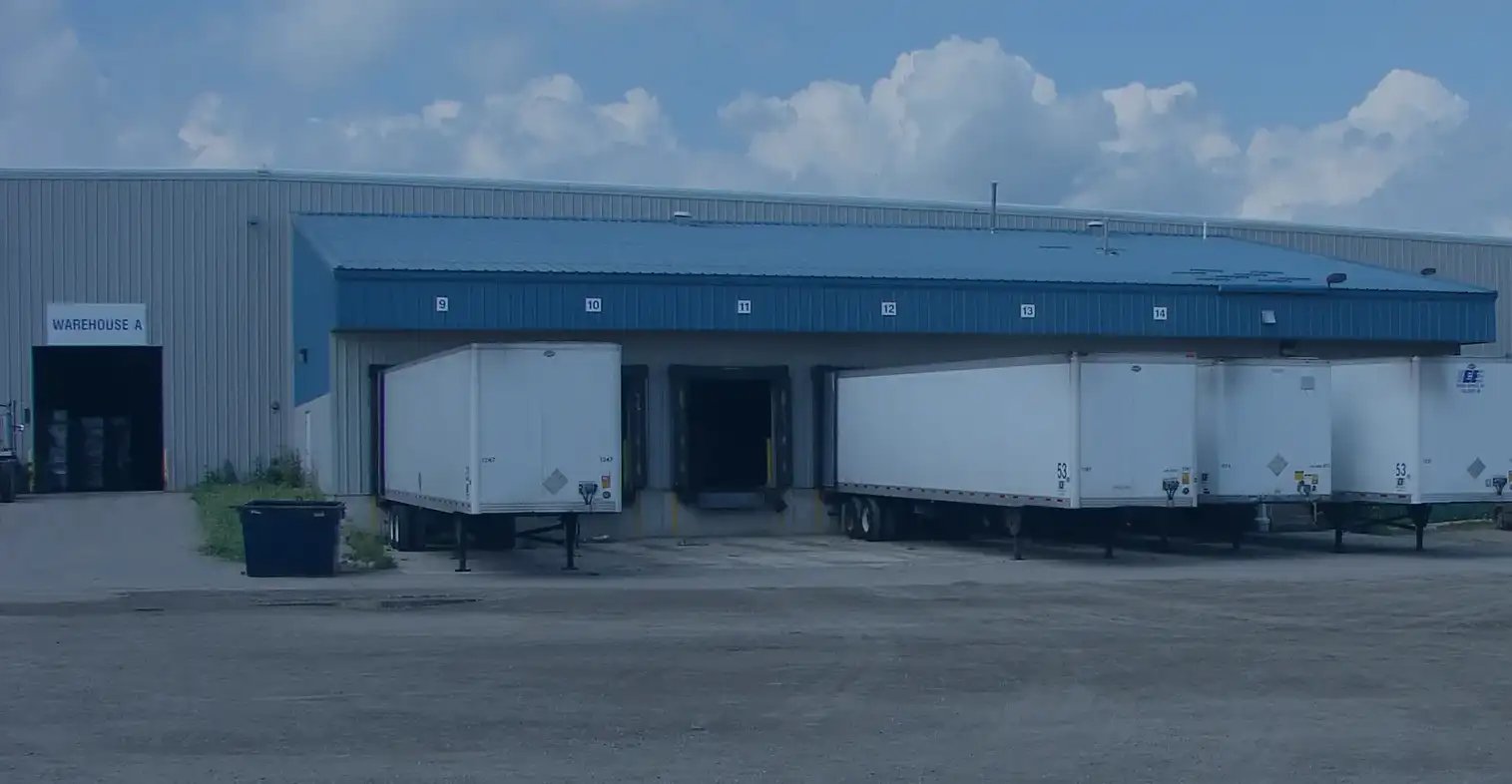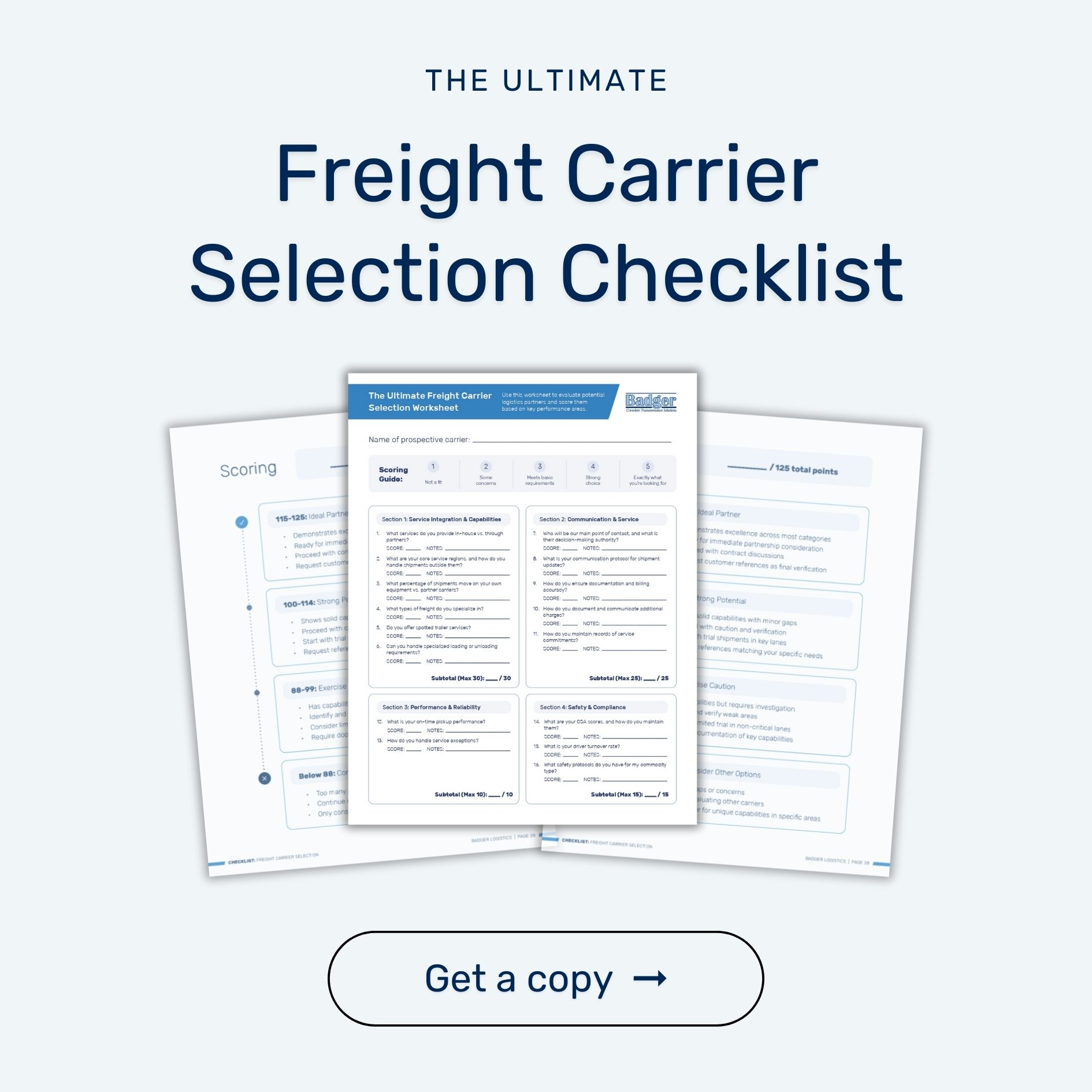Key takeaways
- Tariff changes are creating multiple supply chain challenges, including unpredictable planning horizons, inventory management complications, transportation network disruptions, and increased cost pressures across your operations.
- Integrated logistics providers offer significant advantages during market volatility by providing unified decision-making, flexibility between service types, and consistent service levels even as conditions fluctuate.
- Strategic warehousing becomes critical during tariff uncertainty, allowing you to buffer against supply disruptions, position inventory closer to customers, and maintain flexibility to respond to policy changes.
- Adaptive transportation planning, combining asset-based trucking with brokerage options, creates the flexibility needed to adjust quickly as sourcing patterns and delivery requirements shift.
- Enhanced communication protocols become essential during uncertain times—work with logistics partners who provide dedicated points of contact and transparent visibility into your supply chain.
Badger Logistics helps businesses navigate supply chain uncertainty with our integrated approach to transportation and warehousing. Learn more about our comprehensive logistics solutions and get a competitive rate quote.
A brief introduction
Recent tariff implementations have sent ripples through supply chains across America. At Badger Logistics, we've observed firsthand how these policy shifts are creating challenges for shippers, from manufacturing delays to inventory management complications and shifting transportation needs.
Here's a quick look at some of the numbers coming out about the effect of tariffs on shipping and logistics:
- There's been a sharp decline in bookings nationwide. April 2025 saw a 41% month-over-month drop in nationwide freight bookings, with western regions experiencing declines exceeding 50%. Cross-border terminals, especially those handling freight from Mexico, reported volume reductions of 20% or more, compounded by customs processing delays. (PraxiChain)
- Cargo volume is declining. Following the implementation of 145% tariffs on Chinese imports in April 2025, the Port of Los Angeles anticipated a 35% drop in cargo volumes from Asia, particularly China. This was attributed to major U.S. retailers halting shipments due to increased costs and uncertainties. (Business Insider)
- Shipping routes are being adjusted. Ocean carriers responded by canceling routes and deploying smaller vessels, leading to a 64% decline in ocean container bookings from China to the U.S. in early April 2025. (FreightWaves)

As freight volumes fluctuate and planning horizons shrink, the right logistics partner can make all the difference. Here's how an integrated approach to transportation and warehousing can help your business adapt during uncertain times.
The challenges facing shippers right now
The implementation of new tariffs has created several immediate challenges we're hearing from shippers across just about every industry right now:
- Unpredictable planning windows: Just months ago, many companies could plan their shipping needs a year in advance. Now, with tariff policies changing frequently, many businesses can only plan a few weeks ahead. This makes it hard to budget and schedule effectively.
- Inventory headaches: Consider a company that used to import components just before they needed them. Now, that company might need to store extra inventory as a safety net against future tariff increases or supply disruptions. This creates new storage needs they didn't have before.
- Shifting transport routes: Imagine a business that previously imported finished goods from overseas. With new tariffs, they might switch to domestic suppliers, completely changing their transportation needs from international shipping to regional trucking.
- Cost pressures: A 10-25% tariff increase doesn't just disappear. Companies must either raise prices (risking customer loss) or absorb the costs (hurting profits). Either way, the pressure to cut expenses in other areas grows.
Why logistics integration matters now more than ever
Think about juggling during an earthquake. That's what managing separate trucking, warehousing, and brokerage providers feels like during market changes.
Having one partner for all these services offers clear benefits:
1. One conversation instead of many
Imagine you need to quickly adjust your entire supply chain strategy due to a new tariff announcement. Would you rather:
- Have three separate conversations with three different companies that don't talk to each other, or
- Have one conversation with a single partner who can coordinate all aspects of the change?
When time matters, simplicity wins. One of our clients needed to completely restructure their shipping patterns within a week after tariff changes. Because we handled all their logistics needs, we could implement the change in days rather than weeks.
2. Flexibility to shift services as needs change
Picture this scenario: You learn that tariffs on your imported materials will increase by 15% in 30 days. You decide to import a larger shipment now, before the increase. But where will you store the extra materials?
With separate providers, you'd need to find warehouse space, negotiate rates, set up new accounts, and coordinate between your shipping company and the new warehouse.
|
With an integrated provider like Badger Logistics, you make one phone call. We can expand your warehouse allocation and adjust your transportation schedule in a single conversation.
3. Steady service even when markets get rocky
When market conditions change drastically, single-service providers often struggle. A transportation-only company might have to raise rates suddenly or reduce service levels during disruptions.
Integrated providers can balance resources across service lines. For instance, during recent market shifts, we've been able to maintain service consistency for our clients by adjusting our resource allocation between warehousing, asset-based trucking, and brokerage services.

A few strategic approaches to consider
If your business is feeling the impact of tariff uncertainty, consider these logistics strategies we're deploying for shippers right now.
Strategic warehousing
Think of warehousing not just as storage, but as a strategic buffer. A few things to consider here:
|

Build flexibility into your transport program
Rather than committing to rigid transportation plans, consider these approaches:
|
Our combination of asset-based trucking east of the Mississippi and extensive brokerage network throughout North America provides adaptability for changing market conditions.
Improve your communication approach
Clear, consistent communication becomes even more vital during uncertain times:
|
Our approach features dedicated account managers who provide consistent points of contact for all your logistics needs. They get to know your business inside and out, making it easier to anticipate problems and suggest solutions before issues arise.

Example scenarioImagine you run a manufacturing business outside Milwaukee that makes specialized stainless steel components for food processing equipment. You've been importing 40% of your raw materials from overseas, but new tariffs just increased those costs by 25%. Here's how partnering with Badger Logistics could help you adapt: Week 1: Your Badger account manager meets with your team for a rapid supply chain assessment. Together, you identify which materials are most affected by tariffs and develop a plan to expedite shipments already in transit to beat implementation dates where possible. Week 2: Rather than scrambling to expand your own storage space for buffer inventory, Badger allocates 15,000 square feet in their warehouse. This gives you breathing room to rethink your strategy without rushing into costly decisions. Month 1: With Badger's help, you implement a flexible sourcing strategy. Some materials shift to domestic suppliers, while others remain imported but with larger buffer stocks to protect against future tariff changes. Badger's twice-daily shuttle service connects their warehouse to your facility, making this hybrid approach seamless. Month 3: As your supply sources change, your transportation needs evolve. Instead of managing these changes yourself, Badger adjusts their services accordingly—using their own trucks for regional routes and their brokerage network for specialty equipment needs in new sourcing locations. Month 6: You discover an unexpected advantage—with inventory strategically positioned at Badger's centrally-located warehouse, you can now offer faster delivery to key customers. Your sales team starts using this as a competitive advantage against rivals still struggling with tariff-related delays. The key difference? Instead of managing separate relationships with a trucking company, warehouse provider, and freight broker—all while trying to run your manufacturing business—you have one integrated partner handling all logistics aspects. When tariff policies change again (as they inevitably will), a single phone call sets adjustments in motion across your entire supply chain. |
Moving forward with confidence
While tariffs create challenges, they also create opportunities for companies that can adapt quickly. By working with an integrated logistics partner like Badger Logistics, you gain a partner who can help you navigate these choppy waters.
Think of it this way: When the rules of the game change, the advantage goes to those who can adjust their strategy fastest. An integrated logistics partner gives you that speed and adaptability.
We've been helping businesses adapt to changing market conditions since 1993. Our approach to transportation and warehousing provides the flexibility you need to not just survive but thrive in today's changing marketplace.
Whether you're rethinking your supply chain because of recent tariffs or simply looking to build a more resilient logistics strategy, we're ready to help you find the path forward.
Ready to discuss how an integrated logistics approach can help your business navigate today's tariff challenges? Contact us for a no-obligation consultation and competitive rate quote.
Get the conversation started
Jump to:
Need a logistics partner to help navigate tariff challenges?
Join 500+ shippers solving 95% of their freight challenges with one call.





